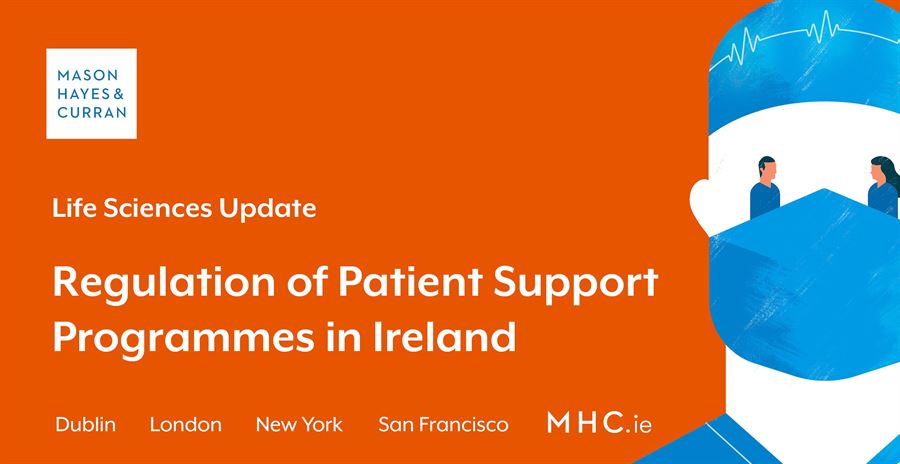
As the pharmaceutical industry evolves, so too has the sophistication of patient support programmes (PSPs) provided by pharmaceutical companies to patients.
A broad range of PSPs are being implemented by pharmaceutical companies to assist patients to take their medication correctly, to improve adherence to treatment and to help facilitate better management of the patient’s disease. The pharmaceutical industry is also moving into the technology sphere in deploying PSPs by developing programmes that utilise apps to provide patient support.
We examine some of the key legal issues that companies should consider as they develop and operate PSPs.
Know your obligations
1. Mandatory considerations
There is no Irish legislation dealing specifically with PSPs. However, certain legal considerations must be taken into account for the operation of a PSP and in particular the information supplied to patients as part of the PSP. What is particularly important for companies to consider is whether this information could be considered as advertising or promoting a medicinal product. This, of course, is an area which is heavily regulated in Ireland.
Under Irish law, advertising prescription-only medicines to the public is prohibited by the Medicinal Products (Control of Advertising) Regulations 2007 (the Advertising Regulations). Pharmaceutical companies should be mindful therefore, that information supplied to patients or patient organisations as part of the PSP should not be of a promotional nature or should not be regarded as a type of marketing of a prescription only medicinal product.
As regards information provided to Healthcare Professionals (HCPs) as part of the PSP, all materials supplied to the HCP should be reviewed to ensure compliance with the Advertising Regulations.
2. Best practice codes
In Ireland, the majority of pharmaceutical companies are members of the Irish Pharmaceutical Healthcare Association (IPHA). The IPHA has issued a Code of Practice for the Pharmaceutical Industry (the IPHA Code), which is an example of best practice in this area and what is considered appropriate for operating PSPs and promoting medicinal products. In addition, the IPHA Code incorporates the provisions of the Advertising Regulations for the purposes of providing practical guidance in implementing the Advertising Regulations.
Only members of the IPHA are required to adhere to the requirements set out in the IPHA Code. However, as it is indicative of best practice in this area, it is useful for companies to consider as they commence development of a PSP.
The IPHA Code refers to a PSP as a Healthcare Support Service (HSS) which is defined as a ‘process enhancement initiative or medical service support (e.g. sharps bin service) provided by a pharmaceutical company that ultimately improves patient care and welfare’.
Of note, the IPHA Code requires that a PSP must have the objectives of monitoring disease activity, achieving better healthcare outcomes and enhancing patient care. The IPHA Code also outlines that decisions regarding provision of the PSP must be based upon objective criteria linked to the defined purpose and not linked to past or future prescription, supply, sale or consumption of a company’s products.
Under the IPHA Code, a PSP must be:
-
Non-promotional
-
Must not be designed as an inducement to prescribe
-
Must not be designed or operated in a promotional manner, and
-
Information collected in the course of the provision of a PSP may not be used for promotional purposes or to plan promotional activity
Further, all patients involved in the PSP must be advised of the company’s involvement and the patient’s consent obtained, when required, according to the IPHA Code.
In addition to the IPHA Code, the Advertising Standards Authority for Ireland (ASAI), the independent self-regulatory body for the advertising industry, has also issued a “Code of Standards for Advertising and Marketing Communications in Ireland” (the ASAI Code). The ASAI Code is also instructive as to what is considered appropriate in terms of information supplied in respect of medicinal products. The ASAI Code notes that prescription only medicines may not be advertised to the public and its provisions reflect the obligations set out in the Advertising Regulations.
Medical Devices Framework
Pharmaceutical companies working with app developers or medical device manufacturers should ensure that any software (e.g. an app) used as part of the PSP and any associated hardware has been appropriately CE marked under the relevant European directives/regulations, including the medical devices framework if applicable.
Data protection
Companies should be aware of their data protection requirements where a PSP involves the protecting or processing of personal data of patients or HCPs. Consideration should be given to issues such as who is the controller of the personal data which is collected and processed as part of the PSP. Pharmaceutical companies should also be cognisant of the risks of data and security breaches when processing personal data and have robust systems in place to mitigate such risks. Data subjects should also be aware that their data is being processed as part of the PSP.
Non-compliance with data protection laws could lead to exposure to enforcement measures being taken by data protection authorities, fines and/or claims taken by individual data subjects.
Intellectual property
Other legal issues may arise particularly where a third party app used as part of the PSP is either white labelled or co-branded with the pharmaceutical company.
There needs to be clarity about the ownership of and cross licensing of IP in the app and device (to the extent required). If configuration or development of the app is required to interact with the device further considerations arise with regard to ownership of newly created IP, whether that is jointly created IP or not.
The parties shall need to resolve their competing goals for use of any newly created IP. The app developer will want to widely commercialise developments and the device owner may have a competing commercial imperative to prevent commercialisation and protect its pre-existing IP. Clear planning and agreement on ownership and licencing of this IP is crucial from the outset.
Liability
Finally, specific consideration will need to be given to liability issues that may arise such as personal injury claims where harm is caused to a patient as a result of the PSP. The co-branded nature of an app used as part of the provision of services under the PSP may also give rise to potential liability concerns.
Conclusion
Overall, in considering the proposed PSP it is important that companies ensure that that they are not engaging in any of the prohibited provisions in the Advertising Regulations, particularly in respect of advertising prescription only medicines. Following the IPHA Code in terms of the operation and establishment of PSPs is one way for companies to demonstrate compliance to best practice and the Advertising Regulations.
It is very important that companies are clear on their obligations in all activities related to the PSP.
For more information on PSPs please contact a member of our Life Sciences team.
The content of this article is provided for information purposes only and does not constitute legal or other advice.
Share this:







